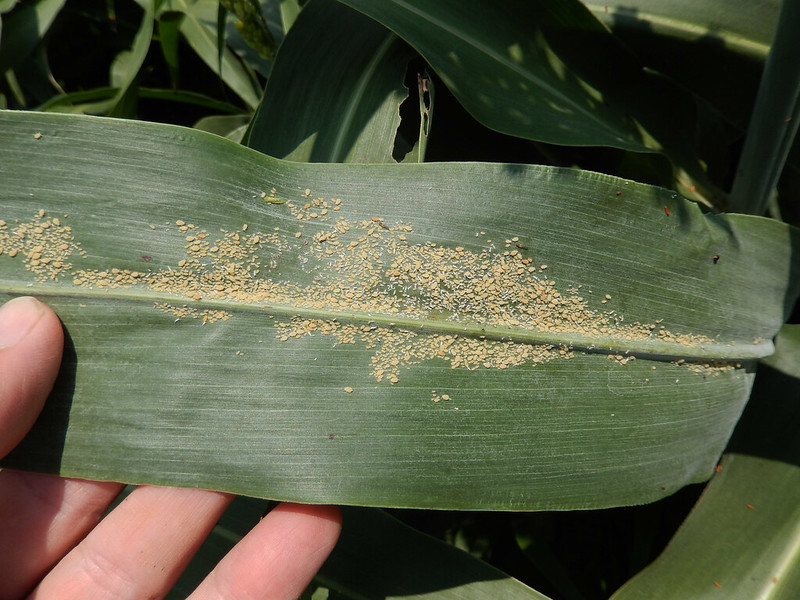Sugarcane aphids in 3 Arkansas counties
By Mary Hightower
U of A System Division of Agriculture
Fast Facts:
-
- Sugarcane aphids confirmed in three Arkansas counties
- Farmers need to be scouting grain sorghum
- Fact sheet on sugarcane aphid downloadable at: www.uaex.uada.edu/publications/FSA-7087.pdf
(380 words)
MONTICELLO, Ark. – Sugarcane aphids, a serious threat to sorghum, have been confirmed in Ashley, Chicot and Desha counties in the southeastern corner of Arkansas.
Nick Seiter, extension entomologist for the University of Arkansas System Division of Agriculture, said the first reports of the insect in sorghum came in two weeks ago and were “mostly limited to small populations.” No fields had been treated yet for the insects.
“In areas where sugarcane aphid has been found, sorghum needs to be scouted regularly, as this insect reproduces very rapidly and can be very damaging to the sorghum crop throughout the growing season,” he said. “Growers should be looking for the aphids themselves as well as sticky honeydew on lower leaves.”
Sugarcane aphids were first spotted in Louisiana, Texas, Oklahoma and Mississippi in 2013. It was first confirmed in Arkansas last year.
“They have been developing in Texas and Louisiana over the last month or so, so they might have moved up” from there, Seiter said. “I suspect there were some small overwintered populations in southeast Arkansas, but it’s impossible to tell how many of the aphids we are seeing now overwintered here versus flying up from the south.”
The aphids excrete a sugary honeydew on sorghum leaves. Black mold can grow in the honeydew and reduce photosynthesis. If infestation is severe, the aphids can cripple or kill the plants. The sticky honeydew is also a menace during harvest, clogging up combines, along with any plants that have died and fallen over, a condition known as “lodging.”
The aphids can also be found in johnsongrass.
Seiter asks that farmers who find sugarcane aphids email a photo and the location to an extension entomologist, to enable them to keep an updated map of aphid infestations.
-
- Nick Seiter, nseiter@uada.edu
- Gus Lorenz, glorenz@uada.edu
- Glenn Studebaker, gstudebaker@uada.edu
A fact sheet on the sugarcane aphid in Arkansas, including control recommendations, may be downloaded at: Fact sheet on sugarcane aphid downloadable at: www.uaex.uada.edu/publications/FSA-7087.pdf
For more information on insect control in crops, contact your county extension office or visit www.uaex.uada.edu, or http://arkansascrops.com.
The Arkansas Cooperative Extension Service is an equal opportunity institution. If you require a reasonable accommodation to participate or need materials in another format, please contact your County Extension office (or other appropriate office) as soon as possible. Dial 711 for Arkansas Relay.
Pursuant to 7 CFR § 15.3, the University of Arkansas System Division of Agriculture offers all its Extension and Research programs and services (including employment) without regard to race, color, sex, national origin, religion, age, disability, marital or veteran status, genetic information, sexual preference, pregnancy or any other legally protected status, and is an equal opportunity institution.
# # #
Dir. of Communication Services
U of A Division of Agriculture
Cooperative Extension Service
(501) 671-2126
mhightower@uada.edu
Related Links
